Related Research Articles

A Letter to Three Wives is a 1949 American romantic drama directed by Joseph L. Mankiewicz and starring Jeanne Crain, Linda Darnell and Ann Sothern. The film was adapted by Vera Caspary and written for the screen by Mankiewicz from A Letter to Five Wives, a story by John Klempner that appeared in Cosmopolitan, based on Klempner's 1945 novel.

Cranford is an episodic novel by English author Elizabeth Gaskell. It first appeared in instalments in the magazine Household Words, then was published with minor revisions as a book with the title Cranford in 1853. The work slowly became popular and from the start of the 20th century it saw a number of dramatic treatments for the stage, the radio and TV.
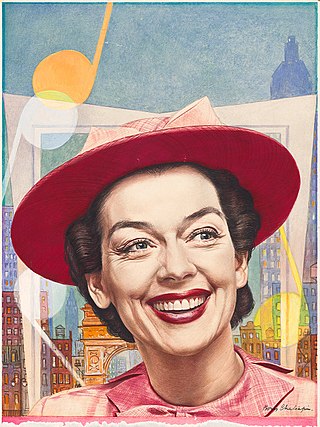
Wonderful Town is a 1953 musical with book written by Joseph A. Fields and Jerome Chodorov, lyrics by Betty Comden and Adolph Green, and music by Leonard Bernstein. The musical tells the story of two sisters who aspire to be a writer and actress respectively, seeking success from their basement apartment in New York City's Greenwich Village. It is based on Fields and Chodorov's 1940 play My Sister Eileen, which in turn originated from autobiographical short stories by Ruth McKenney first published in The New Yorker in the late 1930s and later published in book form as My Sister Eileen. Only the last two stories in McKenney's book were used, and they were heavily modified.
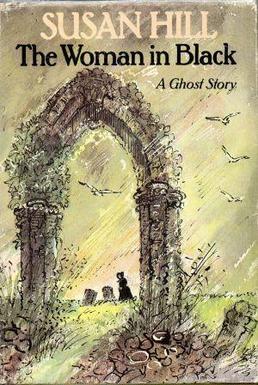
The Woman in Black is a 1983 gothic horror novel by English writer Susan Hill, about a mysterious spectre that haunts a small English town. A television film based on it, also called The Woman in Black, was produced in 1989, with a screenplay by Nigel Kneale. In 2012, another film adaption was released starring Daniel Radcliffe.

The Antiquary (1816), the third of the Waverley novels by Walter Scott, centres on the character of an antiquary: an amateur historian, archaeologist and collector of items of dubious antiquity. He is the eponymous character and for all practical purposes the hero, though the characters of Lovel and Isabella Wardour provide the conventional love interest. The Antiquary was Scott's own favourite of his novels, and is one of his most critically well-regarded works; H. J. C. Grierson, for example, wrote that "Not many, apart from Shakespeare, could write scenes in which truth and poetry, realism and romance, are more wonderfully presented."

The Ghost and Mrs. Muir is a 1947 American supernatural romantic fantasy film starring Gene Tierney and Rex Harrison. It was directed by Joseph L. Mankiewicz, and is based on a 1945 novel written by Josephine Leslie under the pseudonym of R.A. Dick. In 1945, 20th Century Fox bought the film rights to the novel, published only in the United Kingdom at that time. It was shot entirely in California.

The Strange Love of Martha Ivers is a 1946 American noir tragedy film directed by Lewis Milestone and starring Barbara Stanwyck, Van Heflin and Lizabeth Scott. Kirk Douglas appears in his film debut. It follows a man who is reunited with his childhood friend and her husband; both the childhood friend and her husband believe that the man knows the truth about the mysterious death of the woman's wealthy aunt years prior. The screenplay was written by Robert Rossen, adapted from the short story "Love Lies Bleeding" by playwright John Patrick.

The Coming of Bill is a novel by P. G. Wodehouse. It was published as Their Mutual Child in the United States on 5 August 1919 by Boni & Liveright, New York, and as The Coming of Bill in the United Kingdom on 1 July 1920 by Herbert Jenkins Ltd, London. The story first appeared in Munsey's Magazine (US) in May 1914 under the title The White Hope.

Michael Delfino is a fictional character on the ABC television series Desperate Housewives. The character is portrayed by James Denton from the show's inception, until the eighth and final season of the show.
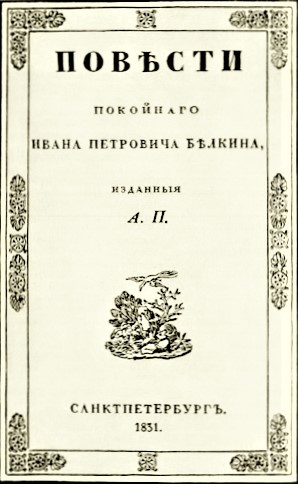
The Tales of the Late Ivan Petrovich Belkin is a series of five short stories and a fictional editorial introduction by Russian author Aleksandr Pushkin. The collection is opened with the editorial, in which Pushkin pretends to be the verbose publisher of Belkin's tales. The tales themselves are not related to one another, except that they are all said in the introduction to be stories told by various people to a recently deceased landowner, Ivan Petrovich Belkin. The introduction continues to say that Belkin was an interesting and mysterious man, even to the point that the woman he left his estate to had never met him. It is also mentioned that Belkin's favorite pastime was to collect and hear stories, several of which are to be presented to the reader.
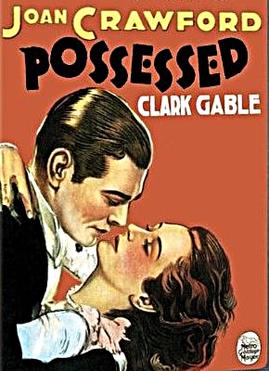
Possessed is a 1931 American pre-Code drama film directed by Clarence Brown, starring Joan Crawford and Clark Gable and released by Metro-Goldwyn-Mayer. The film is the story of Marian Martin, a factory worker who rises to the top as the mistress of a wealthy attorney. The screenplay by Lenore J. Coffee was adapted from the 1920 Broadway play The Mirage by Edgar Selwyn. Possessed was the third of eight film collaborations between Crawford and Gable.

The Magic of Ordinary Days is a Hallmark Hall of Fame production based on a novel of the same name by Ann Howard Creel and adapted as a teleplay by Camille Thomasson. It was directed by Brent Shields, produced by Andrew Gottlieb and stars Keri Russell, Skeet Ulrich, and Mare Winningham.

Stella Dallas is a 1925 American silent drama film that was produced by Samuel Goldwyn, adapted by Frances Marion, and directed by Henry King. The film stars Ronald Colman, Belle Bennett, Lois Moran, Alice Joyce, Jean Hersholt, and Douglas Fairbanks Jr. Prints of the film survive in several film archives.
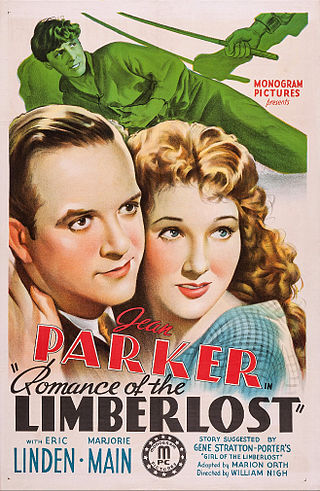
Romance of the Limberlost is a 1938 American drama film directed by William Nigh and starring Jean Parker, Eric Linden, and Marjorie Main.

The Life of Nancy (1895) is a collection of eleven short stories by Sarah Orne Jewett. Following in the tradition of "local color" fiction, Jewett's stories are defined by their detailed descriptions of all aspects of everyday life in the country locales and fishing-towns in which the stories are set. Despite the lack of relation between the characters in each story, a common theme runs through the collection: nostalgia for the past and/or a need for revival of tradition.

Big Stone Gap is a 2014 American drama romantic comedy film written and directed by Adriana Trigiani and produced by Donna Gigliotti for Altar Identity Studios, a subsidiary of Media Society. Based on Trigiani's 2000 best-selling novel of the same name, the story is set in the actual Virginia town of Big Stone Gap circa 1970s. The film had its world premiere at the Virginia Film Festival on November 6, 2014. The film was released on October 9, 2015, by Picturehouse. The film was released in Blu-Ray by Universal Pictures Home Entertainment on February 2, 2016.

Chances is a 1931 American pre-Code war drama film directed by Allan Dwan and starring Douglas Fairbanks, Jr. It is based on the 1930 novel by A. Hamilton Gibbs.
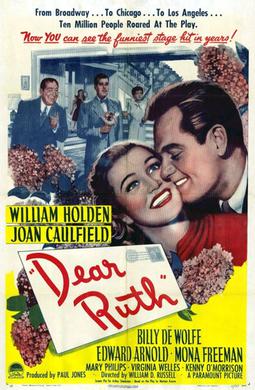
Dear Ruth is a 1947 American romantic comedy film starring Joan Caulfield, William Holden, Mona Freeman, Billy De Wolfe and Edward Arnold. It was based on the 1944 Broadway play of the same name by Norman Krasna.
Martha, Ruth and Edie is a Canadian drama film, released in 1988. An anthology film directed by Deepa Mehta, Norma Bailey and Danièle J. Suissa, the film centres on the titular Martha, Ruth and Edie, who meet after being locked out of the auditorium at a personal development seminar, and instead share personal stories from their own lives among themselves. Each of their stories is a dramatization of a short story by a Canadian writer, and is directed by one of the three credited directors.
References
- ↑ "Canadian playwrights have benefited greatly from Blyth Festival". London Free Press, Joe Belanger, July 4, 2014
- ↑ "Film Review: Martha, Ruth and Edie". The Globe and Mail , August 8, 1988.
- Arp, Thomas R., and Greg Johnson. Perrine's Literature: Structure, Sound, and Sense. USA: The Thomson Corporation, 2006.